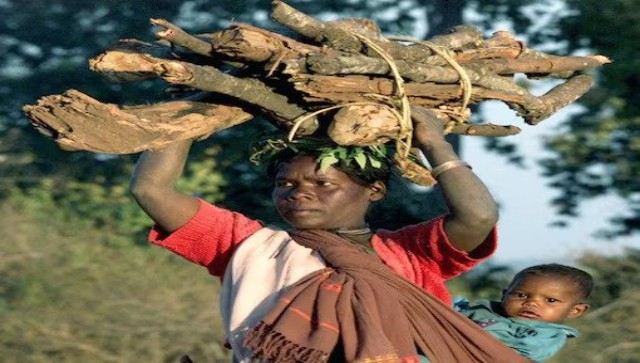Over the decade, climate change has become the centre of global concern and dialogue. Accordingly, global media has continued to project extensive coverage of the issue, which is manifesting in the form of rising temperatures, increasing droughts, floods, cyclones, ice melting, rising sea level, changing patterns of rainfall and snowfall, etc. However, there is one significant aspect of the issue — the climate crisis is not gender-neutral. India has set up its target of 2030 to cut down on greenhouse gas emission intensity – greenhouse gas emissions per unit of GDP. However, India is especially vulnerable to the effects of climate change due to the entrenched systemic social inequalities and frequent environmental blows. Culturally, women in several rural and urban areas are restricted within the liminal spaces of their households even today. Their primary responsibility remains to manage the resources of the home. A significant part of these resources is naturally procured from the forests or through farming. Climate change has an immediate connection to the depletion of natural resources, as one triggers another. Disproportionate responsibilities on women According to UN Women, across the world, women depend more on, yet have less access to, natural resources. In many regions, women bear a disproportionate responsibility for securing food, water, and fuel. As a potential multiplier of social divides and inequality, climate change puts added pressure on women and girls to procure and manage resources. A significant section of rural and semi-urban regions of India do not have access to regular electricity supply, leading women to use alternative sources of energy such as biomass and coal for household chores. Exposure to these inefficient energy sources directly endangers women’s health and longevity. Moreover, due to the patriarchal nature of society, women also suffer physiologically and psychologically, which attains severity with climate change. Several studies have found that women vary from men physiologically and hence their bodies react differently to higher temperatures, which enhances their biological vulnerability. Therefore, women are disproportionately affected by climate change. As aspiring change-makers, we must prioritize the need of the hour and understand this critical intersection. We must take effective steps as we are at a crossroads where our next decisions on climate and equality will strongly alter our nation’s as well as the planet’s fortune. Climate crisis through the lens of intersectional feminism Focusing on the climate crisis through the lens of intersectional feminism, one can understand the way different levels of inequality often function concurrently and worsen each other. It makes it apparent that climate change threatens women, the LGBTQ+ community, people with disabilities, migrants, and those residing in tribal belts, conflict zones, and disaster-prone regions. Gender scholars have also asserted that cognizance of gender dimensions will be crucial for the growth and evolution of effective adaptation and mitigation policies as the climate crisis advances. Yet, limited targeted actions have been executed by nations to create more just and equitable conditions. With COVID-19 and other health hazards further deepening the effects of gender and environmental inequalities, the world must start viewing climatic issues through the lens of gender. Opportunity at 2022 United Nations Climate Change Conference (COP27) The 27th Conference of the Parties (COP27) is scheduled for November in Sharm el-Sheikh, Egypt, whose declaration will set the pretext for further climate action. Events like this help underline issues of gender equality and women’s empowerment at the highest level. It is an opportunity to mobilize member states and private entities to deliberate on the inclusion front and address broader issues of discrimination, socio-cultural barriers, and inequalities that enhance vulnerability. A report by UN Women concluded that to accelerate rights-based transformative climate measures and national development, the ESG (environmental, social and governance) policy frameworks should determine human rights and gender equality as core principles. It should further endorse more significant roles and commitments of women in decision-making. It also calls for cooperation between the state and stakeholders on sectoral policies concerning climate change, human rights, and equality. Hence, to make shared progress, policymakers of the 21st century must work together to foreground the linkages of access to fundamental rights, gender equality, and climate change at national and international levels. Ensure female participation in climate-change policy making The first step could be to invite women as co-designers and co-implementers to participate in climate governance, innovation, technology, and funding. Previous research work by the UN establishes that countries with more women in parliament and women managing local natural resources usually embrace more stringent national climate change approaches. As a result, it leads to lowered emissions, more equitable and inclusive local resource administration, and promising local preservation methods. Ultimately, we must ensure that equal political, sociological, and economic spaces are created for all sections of society, especially for women. For that, the government needs to empower policymakers, grassroots civil society organizations, and youth that see climate change from a gender-neutral rights-based lens. This is where the effort is required in terms of policy engagement. The author is a student at Kautilya School of Public Policy. Views are personal. Read all the Latest News , Trending News , Cricket News , Bollywood News , India News and Entertainment News here. Follow us on Facebook , Twitter and Instagram .
International Girl Child Day: Climate change is not gender neutral, cognizance of vulnerabilities is crucial
Sunidhi Singh
• October 7, 2022, 17:46:32 IST
Across the world, women have less access to natural resources. In many regions, women bear a disproportionate responsibility for securing food, water, and fuel. Climate change, as a potential multiplier of social divides and inequality, puts additional pressure on them
Advertisement
)
End of Article